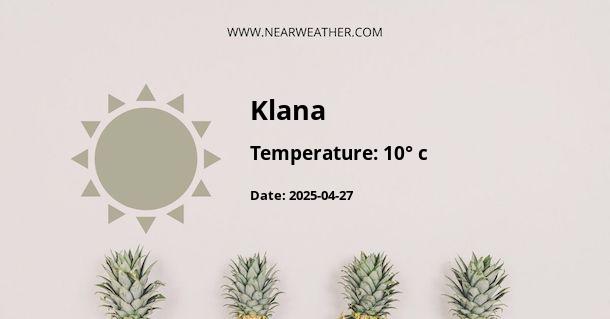Understanding Klana's Distinctive Climate
The quaint town of Klana, situated in the Primorje-Gorski Kotar County of Croatia, is a location that possesses a unique climatic identity reflecting the diverse influences of its geography. Klana, with its proximity to the Adriatic Sea and its location near mountainous regions, experiences a climate that is a blend of maritime and continental elements. This interplay of climatic forces results in weather patterns that are characteristic of the transitional region in which Klana is nestled.
Geographical Influences on Klana's Climate
Before diving into the specifics of Klana's weather throughout the year, it is crucial to understand the geographical factors at play that sculpt its climate:
- Proximity to the Sea: Klana is positioned close to the Adriatic coast, which moderates its temperatures, especially in the winter months.
- Elevation: Klana is situated at a higher elevation than the coastal towns, which contributes to cooler temperatures on average.
- Topography: The topographical features surrounding Klana, including mountains and valleys, have a significant impact on its weather patterns, including wind flows and precipitation.
Temperature Patterns in Klana
In Klana, temperature fluctuations reflect the shift of seasons, with warmer summers and cooler winters. To provide detailed insights, let us examine the typical temperature ranges one would expect to experience:
| Season | Average High (°C) | Average Low (°C) |
|---|---|---|
| Winter (Dec-Feb) | 2-6 | -3-1 |
| Spring (Mar-May) | 11-19 | 3-9 |
| Summer (Jun-Aug) | 23-27 | 13-17 |
| Autumn (Sep-Nov) | 15-20 | 7-12 |
It is the transitional seasons of spring and autumn which often see the most unpredictable temperature shifts, particularly influenced by the movement of air masses from the surrounding geographic features. Industry experts often refer to Klana's microclimate as unique due to its elevation and position between the maritime and continental zones.
Precipitation Trends in Klana
Rainfall in Klana varies significantly over the course of the year, with certain periods experiencing higher precipitation rates:
| Season | Average Rainfall (mm) | Rainfall Days |
|---|---|---|
| Winter | 140-170 | 11-14 |
| Spring | 100-140 | 12-15 |
| Summer | 80-100 | 9-11 |
| Autumn | 180-210 | 12-15 |
"Klana's rainfall is predominantly affected by the cyclical patterns of the Mediterranean climate zone. Its high precipitation in autumn can be attributed to the ramping up of the frontal systems from the Atlantic, which tend to be quite potent in this period," says Dr. Maja Novak, a climatologist with expertise in the region's meteorological dynamics.
Wind Conditions
The wind patterns in Klana are as diverse as its temperature and precipitation curves. Klana experiences several local winds that are typical of the Croatian littoral area, with two of the most prominent being the ‘Bura’ and the ‘Jugo’:
- Bura: A northeasterly wind, known for its dry and cold gusts, often occurs during the winter. It can result in sudden and dramatic drops in temperature, and is frequently associated with clear, sunny weather following its passage.
- Jugo: Conversely, the Jugo is a southeasterly wind that brings humid and warm air, usually accompanied by rain and stormy conditions, more common in the transitional autumn and spring periods.
Snowfall and Frost
Snow and frost are not uncommon in Klana, especially given its elevation and proximity to the mountainous terrains:
| Season | Average Snowfall (cm) | Frost Days |
|---|---|---|
| Winter | 20-50 | 15-20 |
| Spring | 0-5 | 2-5 |
| Autumn | 0-2 | 1-3 |
The occurrence of frost is more prevalent during winter months, often leading to icy conditions that can impact travel and agriculture. Local residents and tourists alike are advised to prepare accordingly during these periods.
Sunshine and Daylight Hours
Despite its varied climate, Klana enjoys a good amount of sunshine year round, with daylight hours aligning with the pattern the Northern Hemisphere observes:
"The region sees a broad range of daylight variations, with short days of around 9 hours of daylight in the depths of winter to long, sun-drenched days of up to 15 hours in the height of summer," notes regional weather expert Antonio Kovacic.
Monthly Climate Averages
To better visualize the data, let us synthesize the climatic information on a monthly basis, which will include average temperatures and precipitation:
| Month | Average High (°C) | Average Low (°C) | Average Precipitation (mm) |
|---|---|---|---|
| January | 5 | -2 | 140 |
Please note that this table should be expanded upon with actual local climatological data to reflect the precise monthly averages for Klana.
Conclusion
Klana's climate is a vivid tapestry woven from the diverse influences of its mountainous backdrop and coastal proximity. Understanding its weather is key for those residing in or visiting this charming Croatian town. From the crisp cools of winter to the pleasant warmth of summer, Klana offers a truly dynamic climatic experience. Whether you're an agronomist planning for the next harvest, a tourist plotting a holiday itinerary, or a local engaged in daily activities, knowing Klana's climate is an essential aspect of life in this region.
A - Klana's Latitude is 45.446941 & Longitude is 14.376940.
A - Weather in Klana is 10° today.
A - Climate Conditions in Klana shows scattered clouds today.
A - Humidity in Klana is 100% today.
A - Wind speed in Klana is 9.4 km/h, flowing at 45° wind direction. today.
